Complex tasks
Complex tasks
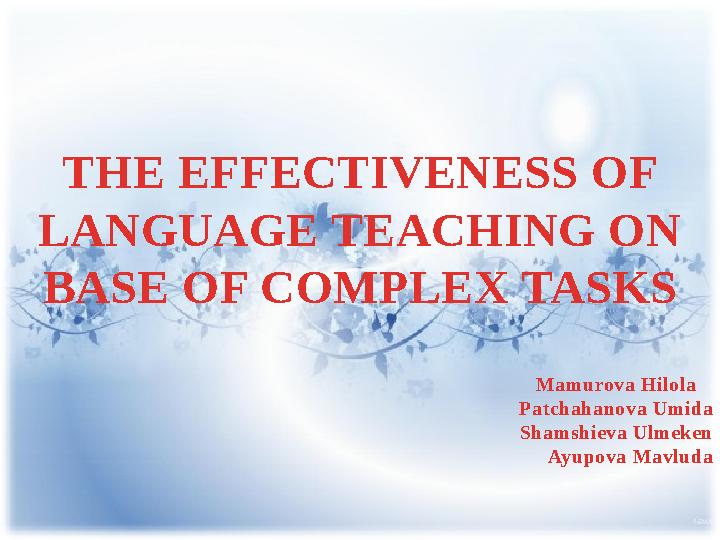

#1 слайд
THE EFFECTIVENESS OF
LANGUAGE TEACHING ON
BASE OF COMPLEX TASKS
Mamurova Hilola
Patchahanova Umida
Shamshieva Ulmeken
Ayupova Mavluda
1 слайд
THE EFFECTIVENESS OF LANGUAGE TEACHING ON BASE OF COMPLEX TASKS Mamurova Hilola Patchahanova Umida Shamshieva Ulmeken Ayupova Mavluda
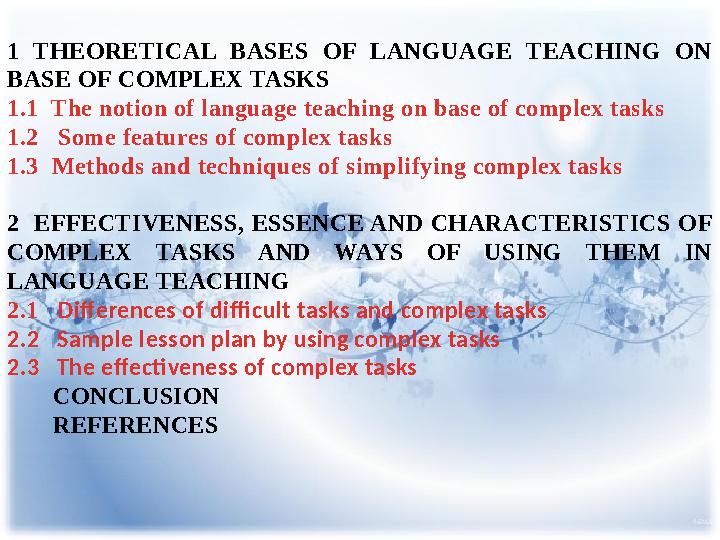
#2 слайд
1 THEORETICAL BASES OF LANGUAGE TEACHING ON
BASE OF COMPLEX TASKS
1.1 The notion of language teaching on base of complex tasks
1.2 Some features of complex tasks
1.3 Methods and techniques of simplifying complex tasks
2 EFFECTIVENESS, ESSENCE AND CHARACTERISTICS OF
COMPLEX TASKS AND WAYS OF USING THEM IN
LANGUAGE TEACHING
2.1 Differences of difficult tasks and complex tasks
2.2 Sample lesson plan by using complex tasks
2.3 The effectiveness of complex tasks
CONCLUSION
REFERENCES
2 слайд
1 THEORETICAL BASES OF LANGUAGE TEACHING ON BASE OF COMPLEX TASKS 1.1 The notion of language teaching on base of complex tasks 1.2 Some features of complex tasks 1.3 Methods and techniques of simplifying complex tasks 2 EFFECTIVENESS, ESSENCE AND CHARACTERISTICS OF COMPLEX TASKS AND WAYS OF USING THEM IN LANGUAGE TEACHING 2.1 Differences of difficult tasks and complex tasks 2.2 Sample lesson plan by using complex tasks 2.3 The effectiveness of complex tasks CONCLUSION REFERENCES
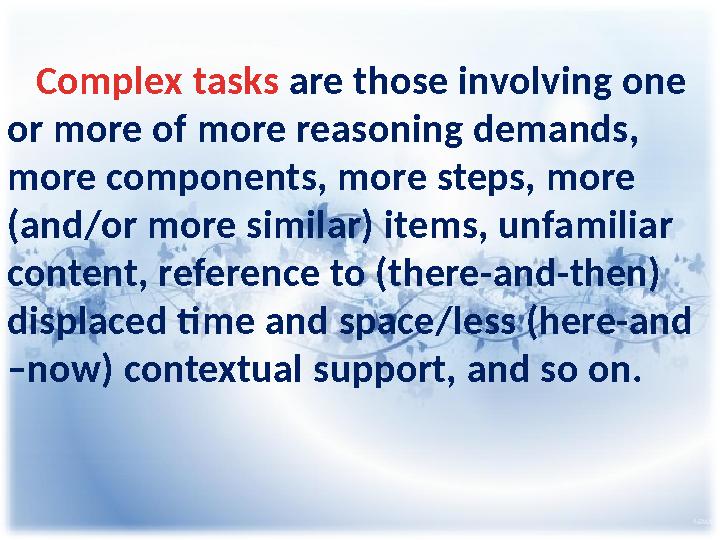
#3 слайд
Complex tasks are those involving one
or more of more reasoning demands,
more components, more steps, more
(and/or more similar) items, unfamiliar
content, reference to (there-and-then)
displaced time and space/less (here-and
–now) contextual support, and so on.
3 слайд
Complex tasks are those involving one or more of more reasoning demands, more components, more steps, more (and/or more similar) items, unfamiliar content, reference to (there-and-then) displaced time and space/less (here-and –now) contextual support, and so on.
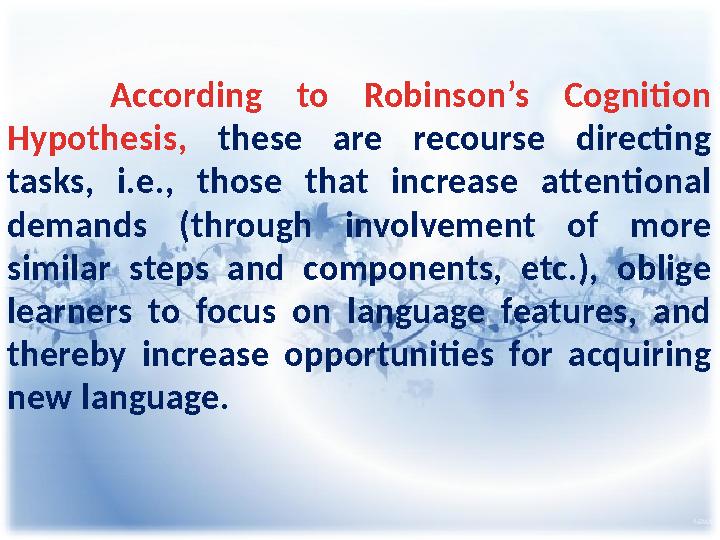
#4 слайд
According to Robinson’s Cognition
Hypothesis, these are recourse directing
tasks, i.e., those that increase attentional
demands (through involvement of more
similar steps and components, etc.), oblige
learners to focus on language features, and
thereby increase opportunities for acquiring
new language.
4 слайд
According to Robinson’s Cognition Hypothesis, these are recourse directing tasks, i.e., those that increase attentional demands (through involvement of more similar steps and components, etc.), oblige learners to focus on language features, and thereby increase opportunities for acquiring new language.
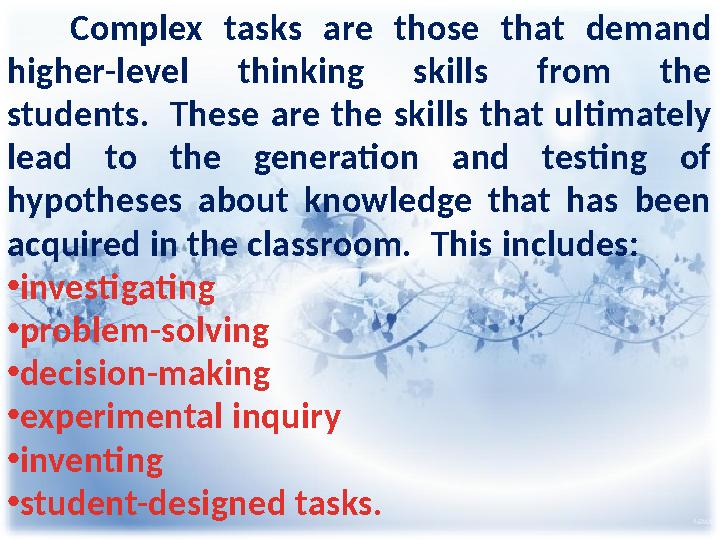
#5 слайд
Complex tasks are those that demand
higher-level thinking skills from the
students.
These are the skills that ultimately
lead to the generation and testing of
hypotheses about knowledge that has been
acquired in the classroom.
This includes:
•investigating
•problem-solving
•decision-making
•experimental inquiry
•inventing
•student-designed tasks.
5 слайд
Complex tasks are those that demand higher-level thinking skills from the students. These are the skills that ultimately lead to the generation and testing of hypotheses about knowledge that has been acquired in the classroom. This includes: •investigating •problem-solving •decision-making •experimental inquiry •inventing •student-designed tasks.

#6 слайд
6 слайд
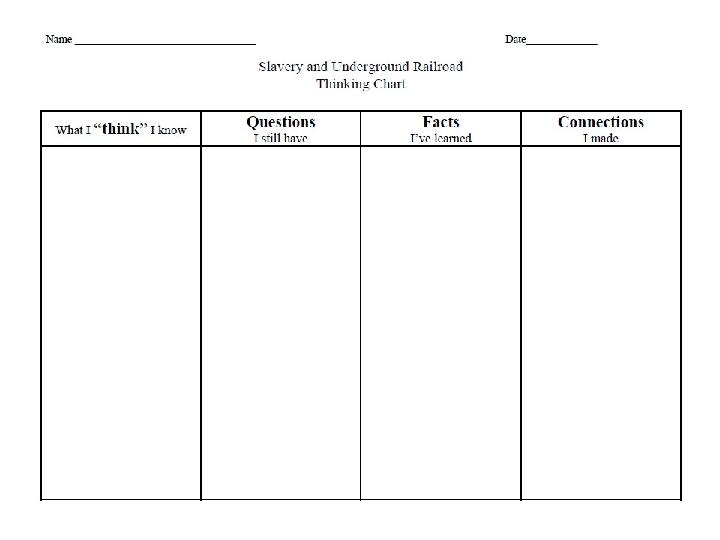
#7 слайд
7 слайд
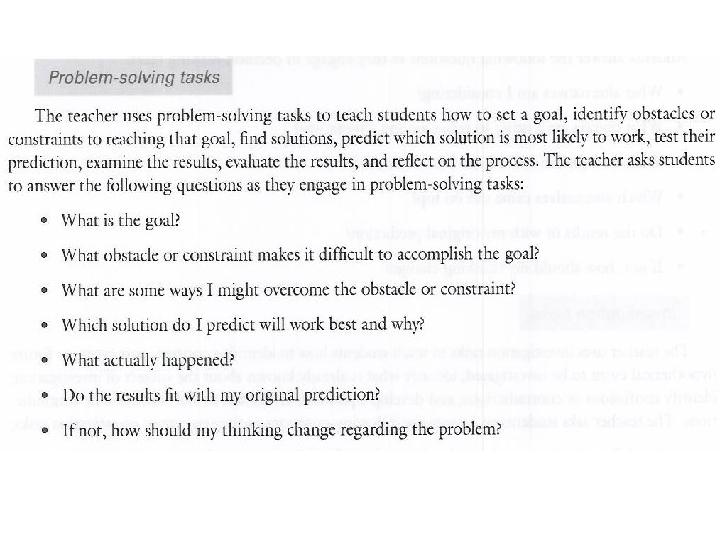
#8 слайд
8 слайд

#9 слайд
Problem solving tasks
Character Analysis
Explain why you think ___ acted the way she did,
and the reasons for her actions.
Do you think ______made a good decision? What
would you have done in a similar situation? Why?
Comparison
Have you ever been in a perilous or life-
threatening situation? Compare your feelings and
reactions to the character’s feelings or reactions.
How are your feelings and reactions the same and
how are they different?
9 слайд
Problem solving tasks Character Analysis Explain why you think ___ acted the way she did, and the reasons for her actions. Do you think ______made a good decision? What would you have done in a similar situation? Why? Comparison Have you ever been in a perilous or life- threatening situation? Compare your feelings and reactions to the character’s feelings or reactions. How are your feelings and reactions the same and how are they different?
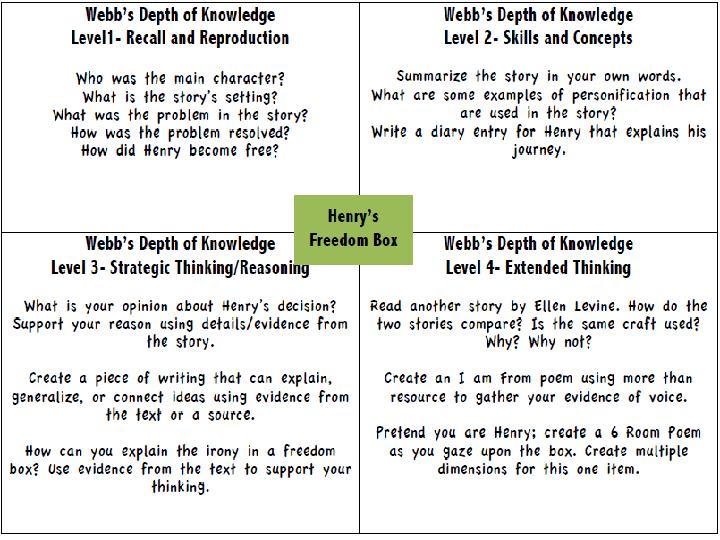
#10 слайд
10 слайд
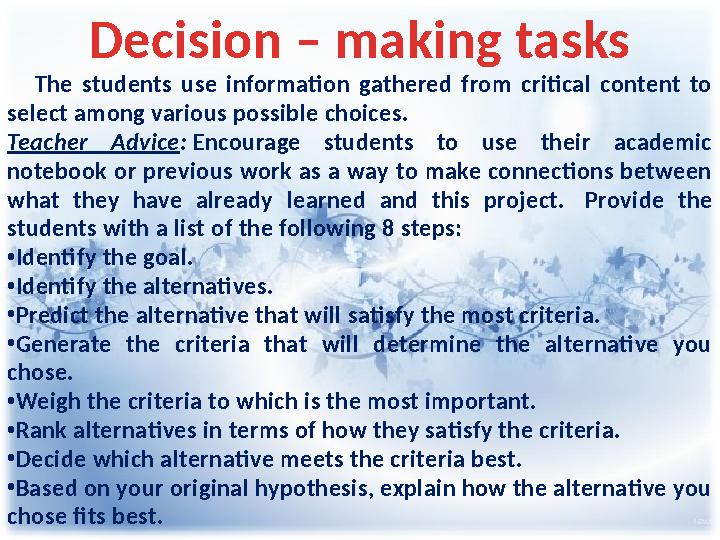
#11 слайд
Decision – making tasks
The students use information gathered from critical content to
select among various possible choices.
Teacher Advice:
Encourage students to use their academic
notebook or previous work as a way to make connections between
what they have already learned and this project.
Provide the
students with a list of the following 8 steps:
•Identify the goal.
•Identify the alternatives.
•Predict the alternative that will satisfy the most criteria.
•Generate the criteria that will determine the alternative you
chose.
•Weigh the criteria to which is the most important.
•Rank alternatives in terms of how they satisfy the criteria.
•Decide which alternative meets the criteria best.
•Based on your original hypothesis, explain how the alternative you
chose fits best.
11 слайд
Decision – making tasks The students use information gathered from critical content to select among various possible choices. Teacher Advice: Encourage students to use their academic notebook or previous work as a way to make connections between what they have already learned and this project. Provide the students with a list of the following 8 steps: •Identify the goal. •Identify the alternatives. •Predict the alternative that will satisfy the most criteria. •Generate the criteria that will determine the alternative you chose. •Weigh the criteria to which is the most important. •Rank alternatives in terms of how they satisfy the criteria. •Decide which alternative meets the criteria best. •Based on your original hypothesis, explain how the alternative you chose fits best.
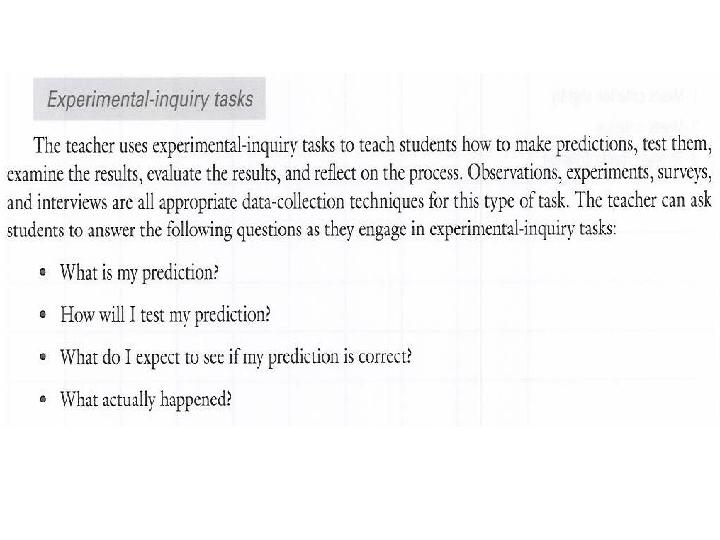
#12 слайд
12 слайд
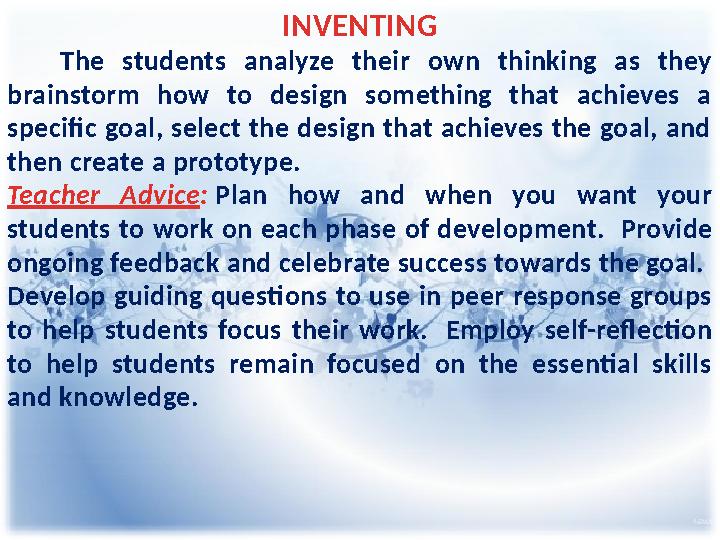
#13 слайд
INVENTING
The students analyze their own thinking as they
brainstorm how to design something that achieves a
specific goal, select the design that achieves the goal, and
then create a prototype.
Teacher Advice: Plan how and when you want your
students to work on each phase of development.
Provide
ongoing feedback and celebrate success towards the goal.
Develop guiding questions to use in peer response groups
to help students focus their work.
Employ self-reflection
to help students remain focused on the essential skills
and knowledge.
13 слайд
INVENTING The students analyze their own thinking as they brainstorm how to design something that achieves a specific goal, select the design that achieves the goal, and then create a prototype. Teacher Advice: Plan how and when you want your students to work on each phase of development. Provide ongoing feedback and celebrate success towards the goal. Develop guiding questions to use in peer response groups to help students focus their work. Employ self-reflection to help students remain focused on the essential skills and knowledge.
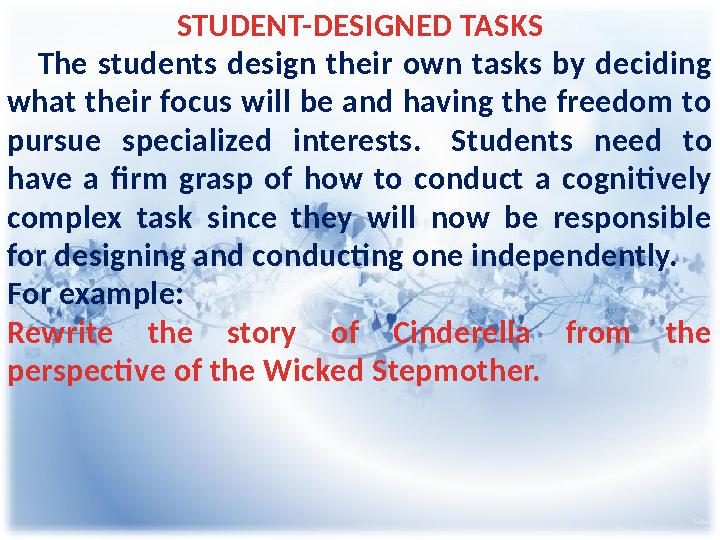
#14 слайд
STUDENT-DESIGNED TASKS
The students design their own tasks by deciding
what their focus will be and having the freedom to
pursue specialized interests.
Students need to
have a firm grasp of how to conduct a cognitively
complex task since they will now be responsible
for designing and conducting one independently.
For example:
Rewrite the story of Cinderella from the
perspective of the Wicked Stepmother.
14 слайд
STUDENT-DESIGNED TASKS The students design their own tasks by deciding what their focus will be and having the freedom to pursue specialized interests. Students need to have a firm grasp of how to conduct a cognitively complex task since they will now be responsible for designing and conducting one independently. For example: Rewrite the story of Cinderella from the perspective of the Wicked Stepmother.
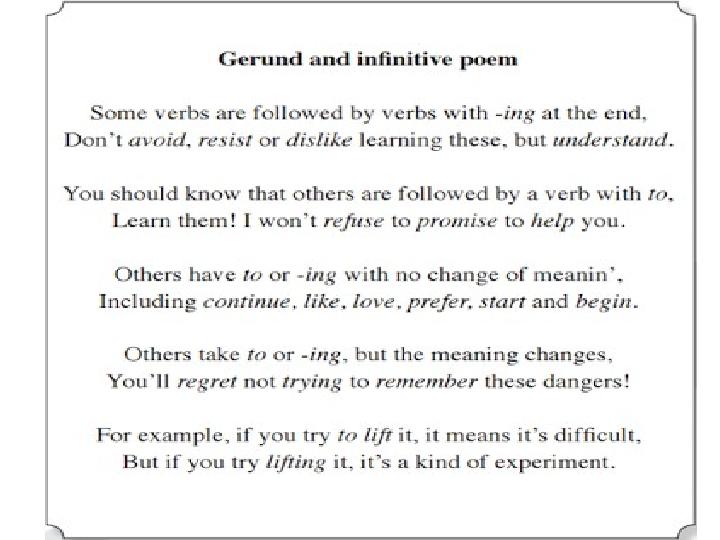
#15 слайд
15 слайд
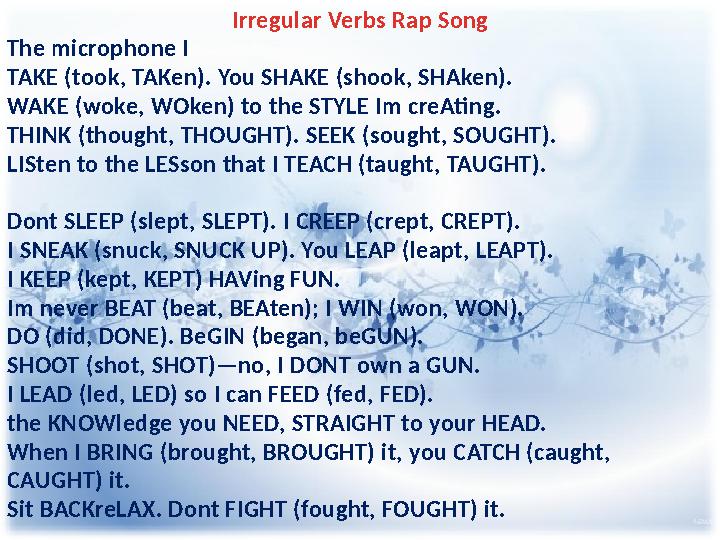
#16 слайд
Irregular Verbs Rap Song
The microphone I
TAKE (took, TAKen). You SHAKE (shook, SHAken).
WAKE (woke, WOken) to the STYLE Im creAting.
THINK (thought, THOUGHT). SEEK (sought, SOUGHT).
LISten to the LESson that I TEACH (taught, TAUGHT).
Dont SLEEP (slept, SLEPT). I CREEP (crept, CREPT).
I SNEAK (snuck, SNUCK UP). You LEAP (leapt, LEAPT).
I KEEP (kept, KEPT) HAVing FUN.
Im never BEAT (beat, BEAten); I WIN (won, WON).
DO (did, DONE). BeGIN (began, beGUN).
SHOOT (shot, SHOT)—no, I DONT own a GUN.
I LEAD (led, LED) so I can FEED (fed, FED).
the KNOWledge you NEED, STRAIGHT to your HEAD.
When I BRING (brought, BROUGHT) it, you CATCH (caught,
CAUGHT) it.
Sit BACKreLAX. Dont FIGHT (fought, FOUGHT) it.
16 слайд
Irregular Verbs Rap Song The microphone I TAKE (took, TAKen). You SHAKE (shook, SHAken). WAKE (woke, WOken) to the STYLE Im creAting. THINK (thought, THOUGHT). SEEK (sought, SOUGHT). LISten to the LESson that I TEACH (taught, TAUGHT). Dont SLEEP (slept, SLEPT). I CREEP (crept, CREPT). I SNEAK (snuck, SNUCK UP). You LEAP (leapt, LEAPT). I KEEP (kept, KEPT) HAVing FUN. Im never BEAT (beat, BEAten); I WIN (won, WON). DO (did, DONE). BeGIN (began, beGUN). SHOOT (shot, SHOT)—no, I DONT own a GUN. I LEAD (led, LED) so I can FEED (fed, FED). the KNOWledge you NEED, STRAIGHT to your HEAD. When I BRING (brought, BROUGHT) it, you CATCH (caught, CAUGHT) it. Sit BACKreLAX. Dont FIGHT (fought, FOUGHT) it.
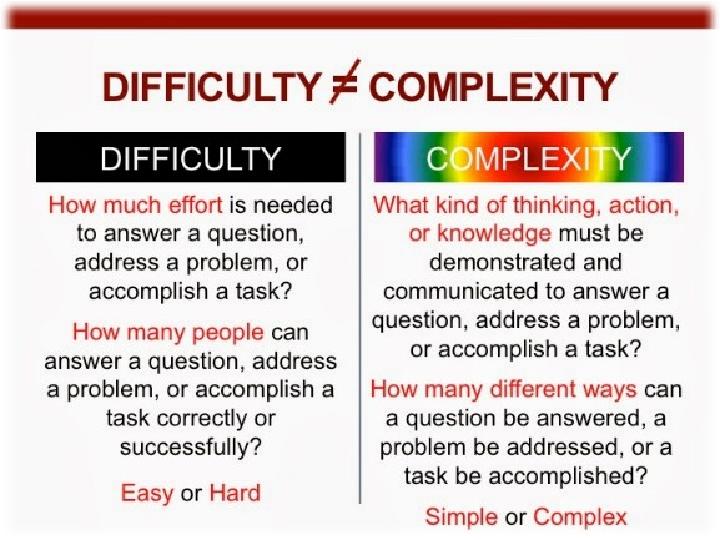
#17 слайд
17 слайд
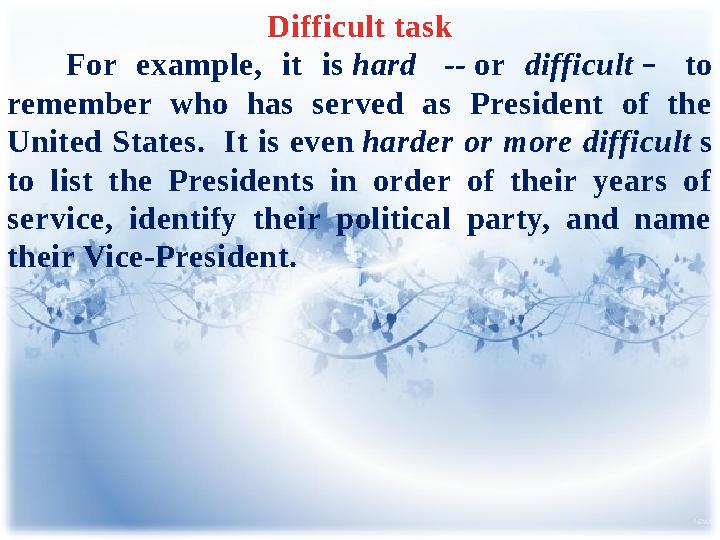
#18 слайд
Difficult task
For example, it is hard -- or difficult – to
remember who has served as President of the
United States. It is even harder or more difficult s
to list the Presidents in order of their years of
service, identify their political party, and name
their Vice-President.
18 слайд
Difficult task For example, it is hard -- or difficult – to remember who has served as President of the United States. It is even harder or more difficult s to list the Presidents in order of their years of service, identify their political party, and name their Vice-President.
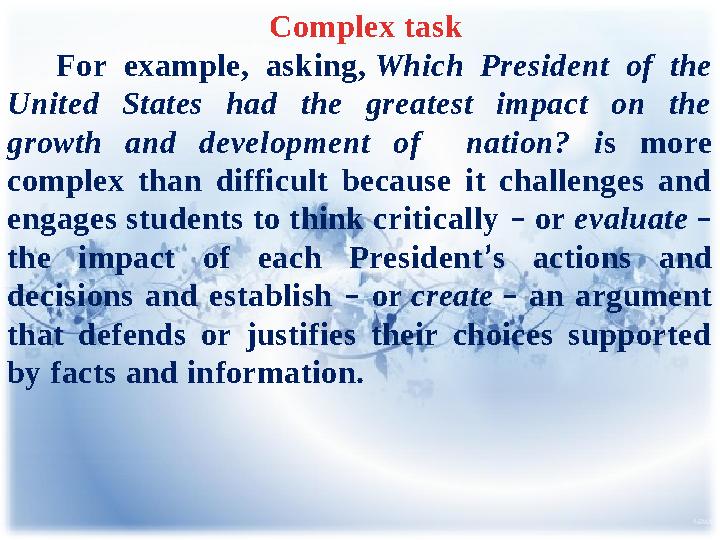
#19 слайд
Complex task
For example, asking, Which President of the
United States had the greatest impact on the
growth and development of nation? is more
complex than difficult because it challenges and
engages students to think critically – or evaluate –
the impact of each President’s actions and
decisions and establish – or create – an argument
that defends or justifies their choices supported
by facts and information.
19 слайд
Complex task For example, asking, Which President of the United States had the greatest impact on the growth and development of nation? is more complex than difficult because it challenges and engages students to think critically – or evaluate – the impact of each President’s actions and decisions and establish – or create – an argument that defends or justifies their choices supported by facts and information.

#20 слайд
English Learning Through Complex Tasks (plan)
This plan consist of multiple complex tasks for the basic
level English subject. The tasks are careful designed in
order to achieve the student’s competence of
communicating in English at a basic level. The design
includes a main unit of competence which describes what
students will be able to do at the end of the semester. It
describes the “product” each student or group of students
will hand in or submit for revision (one for each task), the
task complexity, the kind of research students will carry
out, and the use of ICT (Information and Communication
Technologies). The main purpose of the tasks is focused
on the oral and writing production.
20 слайд
English Learning Through Complex Tasks (plan) This plan consist of multiple complex tasks for the basic level English subject. The tasks are careful designed in order to achieve the student’s competence of communicating in English at a basic level. The design includes a main unit of competence which describes what students will be able to do at the end of the semester. It describes the “product” each student or group of students will hand in or submit for revision (one for each task), the task complexity, the kind of research students will carry out, and the use of ICT (Information and Communication Technologies). The main purpose of the tasks is focused on the oral and writing production.
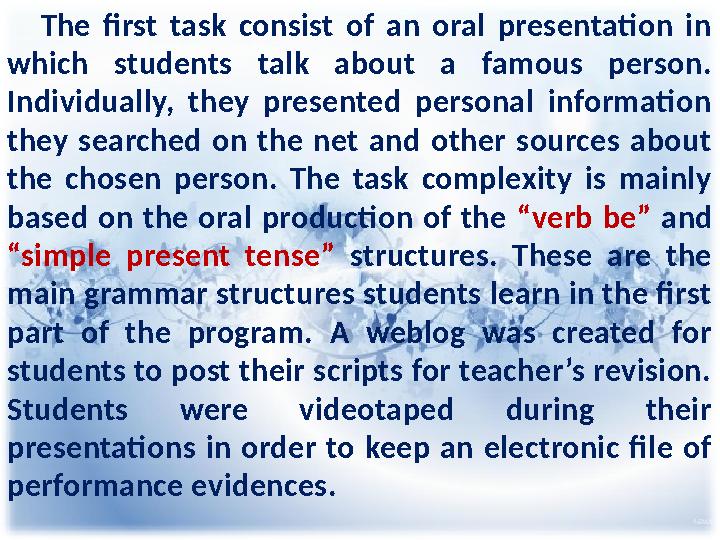
#21 слайд
The first task consist of an oral presentation in
which students talk about a famous person.
Individually, they presented personal information
they searched on the net and other sources about
the chosen person. The task complexity is mainly
based on the oral production of the “verb be” and
“simple present tense” structures. These are the
main grammar structures students learn in the first
part of the program. A weblog was created for
students to post their scripts for teacher’s revision.
Students were videotaped during their
presentations in order to keep an electronic file of
performance evidences.
21 слайд
The first task consist of an oral presentation in which students talk about a famous person. Individually, they presented personal information they searched on the net and other sources about the chosen person. The task complexity is mainly based on the oral production of the “verb be” and “simple present tense” structures. These are the main grammar structures students learn in the first part of the program. A weblog was created for students to post their scripts for teacher’s revision. Students were videotaped during their presentations in order to keep an electronic file of performance evidences.
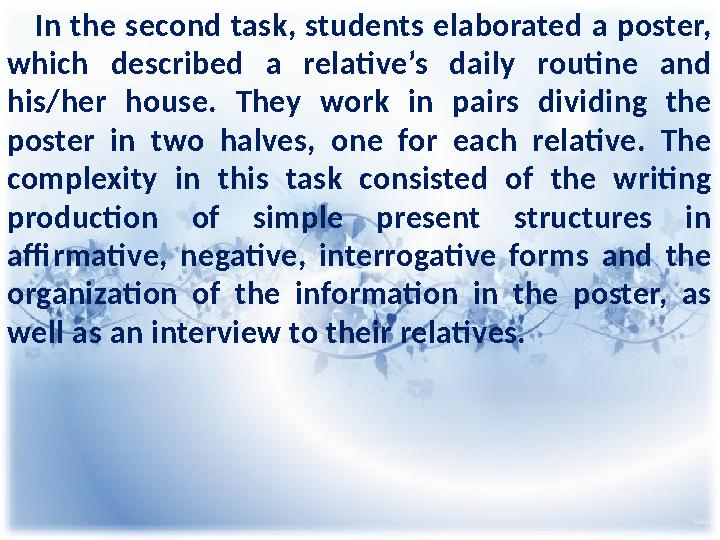
#22 слайд
In the second task, students elaborated a poster,
which described a relative’s daily routine and
his/her house. They work in pairs dividing the
poster in two halves, one for each relative. The
complexity in this task consisted of the writing
production of simple present structures in
affirmative, negative, interrogative forms and the
organization of the information in the poster, as
well as an interview to their relatives.
22 слайд
In the second task, students elaborated a poster, which described a relative’s daily routine and his/her house. They work in pairs dividing the poster in two halves, one for each relative. The complexity in this task consisted of the writing production of simple present structures in affirmative, negative, interrogative forms and the organization of the information in the poster, as well as an interview to their relatives.
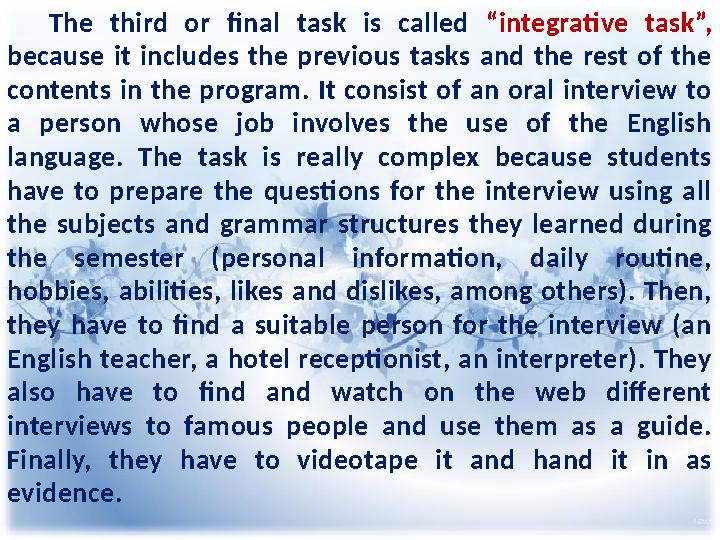
#23 слайд
The third or final task is called “integrative task”,
because it includes the previous tasks and the rest of the
contents in the program. It consist of an oral interview to
a person whose job involves the use of the English
language. The task is really complex because students
have to prepare the questions for the interview using all
the subjects and grammar structures they learned during
the semester (personal information, daily routine,
hobbies, abilities, likes and dislikes, among others). Then,
they have to find a suitable person for the interview (an
English teacher, a hotel receptionist, an interpreter). They
also have to find and watch on the web different
interviews to famous people and use them as a guide.
Finally, they have to videotape it and hand it in as
evidence.
23 слайд
The third or final task is called “integrative task”, because it includes the previous tasks and the rest of the contents in the program. It consist of an oral interview to a person whose job involves the use of the English language. The task is really complex because students have to prepare the questions for the interview using all the subjects and grammar structures they learned during the semester (personal information, daily routine, hobbies, abilities, likes and dislikes, among others). Then, they have to find a suitable person for the interview (an English teacher, a hotel receptionist, an interpreter). They also have to find and watch on the web different interviews to famous people and use them as a guide. Finally, they have to videotape it and hand it in as evidence.
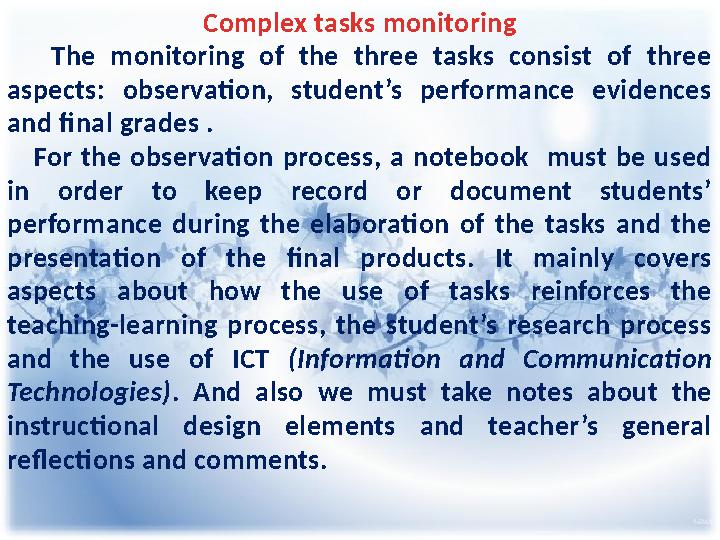
#24 слайд
Complex tasks monitoring
The monitoring of the three tasks consist of three
aspects: observation, student’s performance evidences
and final grades .
For the observation process, a notebook must be used
in order to keep record or document students’
performance during the elaboration of the tasks and the
presentation of the final products. It mainly covers
aspects about how the use of tasks reinforces the
teaching-learning process, the student’s research process
and the use of ICT (Information and Communication
Technologies). And also we must take notes about the
instructional design elements and teacher’s general
reflections and comments.
24 слайд
Complex tasks monitoring The monitoring of the three tasks consist of three aspects: observation, student’s performance evidences and final grades . For the observation process, a notebook must be used in order to keep record or document students’ performance during the elaboration of the tasks and the presentation of the final products. It mainly covers aspects about how the use of tasks reinforces the teaching-learning process, the student’s research process and the use of ICT (Information and Communication Technologies). And also we must take notes about the instructional design elements and teacher’s general reflections and comments.
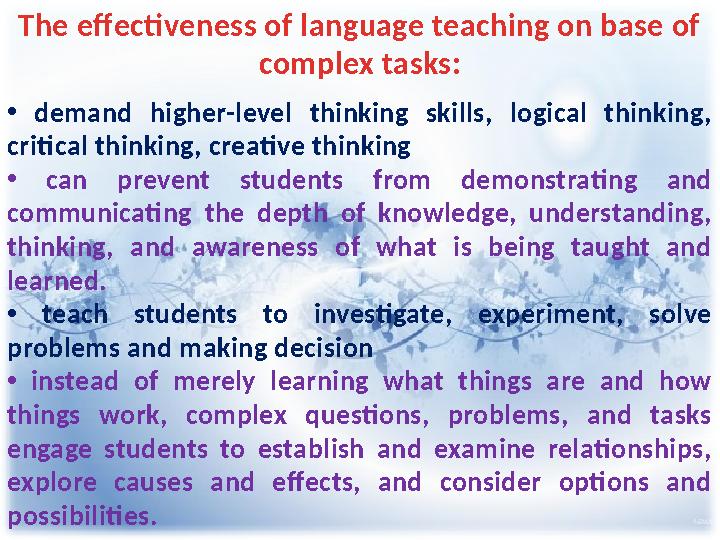
#25 слайд
The effectiveness of language teaching on base of
complex tasks:
• demand higher-level thinking skills, logical thinking,
critical thinking, creative thinking
• can prevent students from demonstrating and
communicating the depth of knowledge, understanding,
thinking, and awareness of what is being taught and
learned.
• teach students to investigate, experiment, solve
problems and making decision
• instead of merely learning what things are and how
things work, complex questions, problems, and tasks
engage students to establish and examine relationships,
explore causes and effects, and consider options and
possibilities.
25 слайд
The effectiveness of language teaching on base of complex tasks: • demand higher-level thinking skills, logical thinking, critical thinking, creative thinking • can prevent students from demonstrating and communicating the depth of knowledge, understanding, thinking, and awareness of what is being taught and learned. • teach students to investigate, experiment, solve problems and making decision • instead of merely learning what things are and how things work, complex questions, problems, and tasks engage students to establish and examine relationships, explore causes and effects, and consider options and possibilities.

#26 слайд
Thank you for
your attention
26 слайд
Thank you for your attention

шағым қалдыра аласыз
















